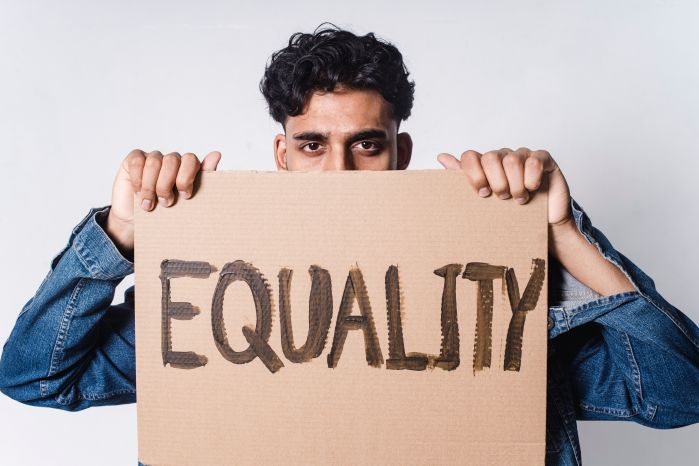
As defined by the United Nations, human rights are“rights inherent to all human beings, regardless of race, sex, nationality, ethnicity, language, religion, or any other status.” During December, we are encouraged to remember and celebrate those who have fought for human rights in the past and to also think about the ways in which we can continue to fight for them today.
December 10 commemorates the adoption of the Universal Declaration of Human Rights by the United Nations in 1948. The Universal Declaration of Human Rights was written together by people of different backgrounds with the goal of creating a basic standard for treating all human beings. It has since been used as a model for various human rights legislation. This day has been internationally celebrated for over seventy years and is known as Human Rights Day. Universal Human Rights month extends this celebration throughout the entire month of December.
Rampant poverty, pervasive inequalities and structural discrimination are human rights violations and among the greatest global challenges of our time. Addressing them effectively requires measures grounded in human rights, renewed political commitment and participation of all, especially those most affected. We need a new social contract which more fairly shares power, resources and opportunities and sets the foundations of a sustainable human rights-based economy.
Human rights, including economic, social and cultural rights as well as the right to development and the right to a safe, clean, healthy and sustainable environment, are central to building a new human rights-based economy that supports better, fairer and more sustainable societies for present and future generations. A human rights-based economy should be the foundation of a new social contract.
Successive financial and health crises have had long-lasting and multidimensional impacts on millions of young people. Unless their rights are protected, including through decent jobs and social protection, the “COVID generation” runs the risk of falling prey to the detrimental effects of mounting inequality and poverty.
Vaccine injustice through unfair vaccine distribution and hoarding contravenes international legal and human rights norms and the spirit of global solidarity. The call for a common agenda and a new social contract between Governments and their people is the need of the hour so as to rebuild trust and to ensure a life of dignity for all.
Environmental degradation, including climate change, pollution and nature loss, disproportionately impacts persons, groups and peoples in vulnerable situations. These impacts exacerbate existing inequalities and negatively affect the human rights of present and future generations. In follow-up to the HRC’s recognition of the human right to a clean, healthy and sustainable environment, urgent action must be taken to respect, protect and fulfil this right. Such action should be the cornerstone of a new human rights-based economy that will produce a green recovery from COVID-19 and a just transition.
Human rights have the power to tackle the root causes of conflict and crisis, by addressing grievances, eliminating inequalities and exclusion and allowing people to participate in decision-making that affect their lives. Societies that protect and promote human rights for everyone are more resilient societies, better equipped through human rights to weather unexpected crises such as pandemics and the impacts of the climate crisis. Equality and non-discrimination are key to prevention: all human rights for all ensure everyone has access to the preventive benefits of human rights but, when certain people or groups are excluded or face discrimination, the inequality will drive the cycle of conflict and crisis.
Learn more:
Check back soon for Universal Human Rights related events
Susan Bitensky is a Professor in the College of Law. Her research interests include children’s rights and international human rights law.
Bitensky has written book chapters, articles and a book. Dr. Bitensky has written a book about children’s rights entitled, Corporal Punishment of Children: A Human Rights Violation.
Elizabeth Drexler is an Associate Professor in the Department of Anthropology and Director of Peace and Justice Studies. Among her various research interests, Drexler studies human rights, law, and transitional justice.
Drexler has published numerous articles and book chapters, and a book. Her most recent article “Speaking truth to power in a post-truth era: Multidimensional and intersectional justice” was published in Anthropology Today in 2020.
Jennifer Goett is an Associate Professor in James Madison College. Her research interests include human rights, violence and the state, and social movements.
Goett has recently co-authored an article on youth activism entitled, “¡Matria libre y vivir!: Youth Activism and Nicaragua's 2018 Insurrection” in The Journal of Latin American and Caribbean Anthropology. Her book, Black Autonomy: Race, Gender, and Afro-Nicaraguan Activism was published in 2016.
Laurie Medina is an Associate Professor in the Department of Anthropology and the Director for the Center for Latin American and Caribbean Studies. Dr. Medina’s scholarly interests include Indigenous rights struggles and the production of International Indigenous Rights Law.
Medina has recently co-authored the article “Gendered Considerations for Safety in Conservation Fieldwork” in Society and Natural Resources in 2018. She has also published a book on Belize entitled Negotiating Economic Development: Identity Formation and Collective Action in Belize.
Frank Ravitch is a Professor in the College of Law. His research interests include civil rights law and disability discrimination.
Ravitch has published numerous booksincluding Freedom’s Edge: Religious Freedom, Sexual Freedom, and the Future of America and has most recently co-edited a book entitled Law, Religion and Tradition.
Check back soon for more resources related to the Universal Human Rights movement in our community